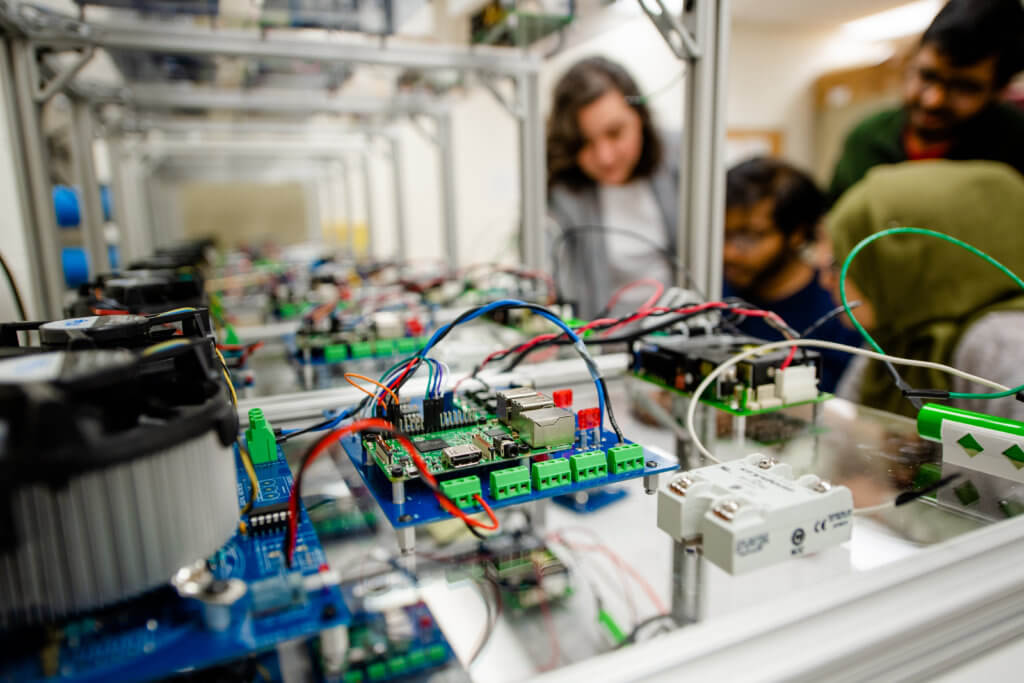Getting a quality education in a highly-ranked university makes for an incredible experience, but what if it also lands you a job with a competitive salary?
That is what the Department of Electrical and Computer Engineering (ECE) at Michigan Technological University has been providing for its students since 1928. The proof is all in the rankings — the university’s engineering graduates have been included in the top three list of the in-state Return of Investment report, earning an average base salary of US$80,000 per year. The US Bureau of Labor Statistics (BLS) lists engineers as having a mean annual wage of US$90,300, and the field is projected to have employment growth of nearly 140,000 new jobs over the next decade.
Given the encouraging data, a future in engineering is a transformative path that provides invaluable returns for an educational investment at Michigan Tech. Engineering at Michigan Tech is more than just about employment prospects; it’s about long-term stability in a field that is constantly geared for future innovations.

Source: Michigan Technological University
Competitively-ranked with a high return in value
Michigan Tech is unique in its holistic far-reaching approach to engineering. At the university’s ECE Department, its threefold mission — cultivating career-readiness, leading scholarly research and industry-wide technical leadership — is aimed to also include the local and larger national community on top of students and faculty members.
Lifelong excellence and impact underpin the opportunities available for students at the department. Look no further than its list of distinguished alumni. They include top-ranked officers in the US government, such as the US Department of Defense, and key industry players in large corporations like Google and AT&T.
These successes are due to the recognition that engineering graduates receive from prospective employers. As a Michigan Tech-trained engineer, your career could take off almost immediately: more than 350 employers recruit for internships, co-ops and full-time work frequently at the university. Up to 98% of graduates manage to secure a position within their field, enlist in the military or enter graduate school — all within six months of obtaining their degree.
The return value for your education at the university is even greater when taking the flexibility factor into account. If you’re a working professional seeking to upgrade your engineering knowledge, the ECE Department offers the MS in Electrical and Computer Engineering (Power Systems) program.
Offered both in-person and offline, this new degree comes with no required courses, and allows students to set a flexible mix of coursework in electric and computer engineering and other related fields. Students will work with a Graduate Academic Advisor to chart their programme according to their needs and career goals.

On top of its strong industry connections, engineering at Michigan Tech is interdisciplinary and features flexible study options for working professionals to pursue graduate qualifications. Source: Michigan Technological University
Bridging academia, research and industry
So what can you expect as an ECE student over the course of your studies? One thing is for sure — ECE at Michigan Tech is never siloed within its own field. The courses and research are interdepartmental, where the study of energy distribution is wholly integrated with advancing technologies in the real world. The department collaborates across disciplines in various projects such as building nanosatellites, equipping vehicles to be energy-efficient, deploying underwater robots, and developing healthcare tools to assist providers in their day-to-day tasks.
With a selection of 17 degree programmes, ECE at Michigan Tech allows students to hone in on a particular area within their respective degrees. Existing ECE undergraduate students continuing into graduate school can shorten their study duration with the Electrical and Computer Engineering Accelerated MS, which allows up to six senior credits toward a Bachelor of Science in Electrical or Computer Engineering and a Master of Science in Electrical or Computer Engineering. If PhD is looking like it might be on the horizon, the programme also offers a thesis option, while industry-inclined students can opt for the coursework route.
Other graduate-level ECE programmes include PhD options in Electrical Engineering and Computer Engineering, both of which form a network of unparalleled research in a close-knit academic community committed to mentoring its students. The research projects are funded by multiple agencies and corporations, including the US Army and Air Force and American Electric Power. If short-term study is your aim, the Department also has a selection of Graduate Certificates in areas ranging from Advanced Electric Power Engineering to Safety and Security of Autonomous Cyber-Physical Systems for working professionals possessing a bachelor’s degree in engineering, with some courses offering online or on-campus learning options.

Source: Michigan Technological University
Of course, the achievements of ECE students at the university would not be possible without quality teaching. The department consists of seasoned leaders in the field, including experts in the US space program and the International Space Station. A number of its instructors have won the annual inter-faculty Michigan Tech Distinguished Teaching Award, attesting to ECE’s exceptional teaching lineup.
“The passion for education and knowledge shared by our faculty members is evident in their classrooms and laboratories,” says Glen E. Archer, Principal Lecturer and Interim Chair.
Michigan Tech’s location in the stunning Upper Peninsula is just a few miles away from Lake Superior, the largest and northernmost of the Great Lakes, and overlooks the Keweenaw Waterway. The small-town atmosphere and inclusive campus community contributed to its reputation as the safest college in the US. With a conducive environment to continue your learning, choosing Michigan Tech could be the key to unlock your professional success. Not only that, Michigan Tech also does not charge application fees, offering rolling admissions instead. Interested applicants should keep track of the deadlines due to its short lead times.
To apply now, click here for a bright start to your engineering career.
Follow Michigan Tech on Facebook, Twitter, LinkedIn, and Instagram













